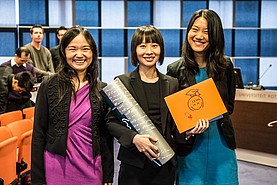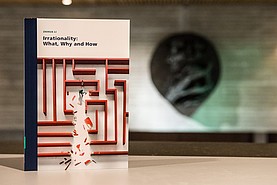PhD Defence: Irrationality - What, Why and How

ERIM’s Zhihua Li confronts the many dimensions of irrationality in her dissertation, ‘Irrationality: What, Why and How’. The ‘What’ covers develops both an understanding on the topic of irrationality and a creative tool for measurement of irrationality through use of an incentive system. ‘Why’ explores the influence of ambiguity on irrationality and the reasons we reject irrationality. Lastly, ‘How’ debates the idea of imposing better decisions on individuals when freedom of choice is lacking and interestingly recommends paternalism, going as far as to develop a litmus test which can be used to measure ones attitude towards paternalism.
Zhihua Li defended her dissertation in the Senate Hall at Erasmus University Rotterdam on Thursday, 18 December 2014. Her supervisors were Professor Han Bleichrodt, Professor Peter Wakker, and Professor Kirsten Rohde. Other members of the Doctoral Committee included Dr. Aurélien Baillon (ERIM), Professor Jack Vromen (EUR), and Professor Justus Veenman (EUR).
About Zhihua Li

Zhihua Li (1986) holds a Bachelor’s degree in Business Administration from China University of Geosciences (CUG) and a second Bachelor’s degree in Biology Science from Wuhan University. Her grades ranked 1st among graduates of year 2008 at School of Management, CUG. She also holds a Master’s degree with highest distinction in Organizational Behaviour from Erasmus Research Institute of Management, Rotterdam School of Management. In October 2010, Zhihua was promoted by Prof. Han Bleichrodt and Prof. Peter P. Wakker as a PhD candidate in Behavioural Economics and joined Department of Applied Economics, Erasmus School of Economics. Her daily supervisor is Prof. Kirsten I.M. Rohde. With the interest in contributing to a deeper understanding of decision-making and judgements, she carried out reseaches testing economic theories in the enviroment of imperfect decision She also takes a special interest in bridging advancements in decision theory and improvements of real life decisions.
As part of her PhD training, Zhihua spent time as a visiting researcher at National University of Singapore.makers, as well as applying rational theories to improve decision-making quality. he has presented her work at different conferences and worshops such as Foundations of Utility and Risk (FUR), Subjective Probability, Utility and Decision Making (SPUDM), TIBER/Erasmus Behavioral Economics - workshop, Learning, Decision and Bounded Rationality Workshop. Her work has also been presented at conferences and leading research institutes such as Decision Theory Forum (DT), National University of Singapore, Nanyang Techonological University, University of Zurich. Currently, she works as a research fellow at the University of Warwick.
Thesis Abstract

This thesis has made a special effort to explore some relevant issues on (ir)rationality. Chapter 2 and Chapter 3 answer the question what is irrationality. Chapter 2 improves the methodology to measure irrationality by proposing a new incentive system on individual decision-making: the prior incentive system (Prince). Chapter 3 addresses the issue of irrationality in decisions under ambiguity. Chapter 4 answers the question of why we steer people away from irrationality. Chapter 4 discusses whether we should correct people's irrationality by imposing a better decision when freedom of choice cannot be realized. Chapter 4 concludes with recommending strong paternalism and provides a litmus test for people's views on paternalism. Chapter 5 answers the question how to make people less irrational. Chapter 5 studies the social influences on people's decision-making processes and offers possible approaches to nudge people away from irrationality.
Photos: Chris Gorzeman / Capital Images


